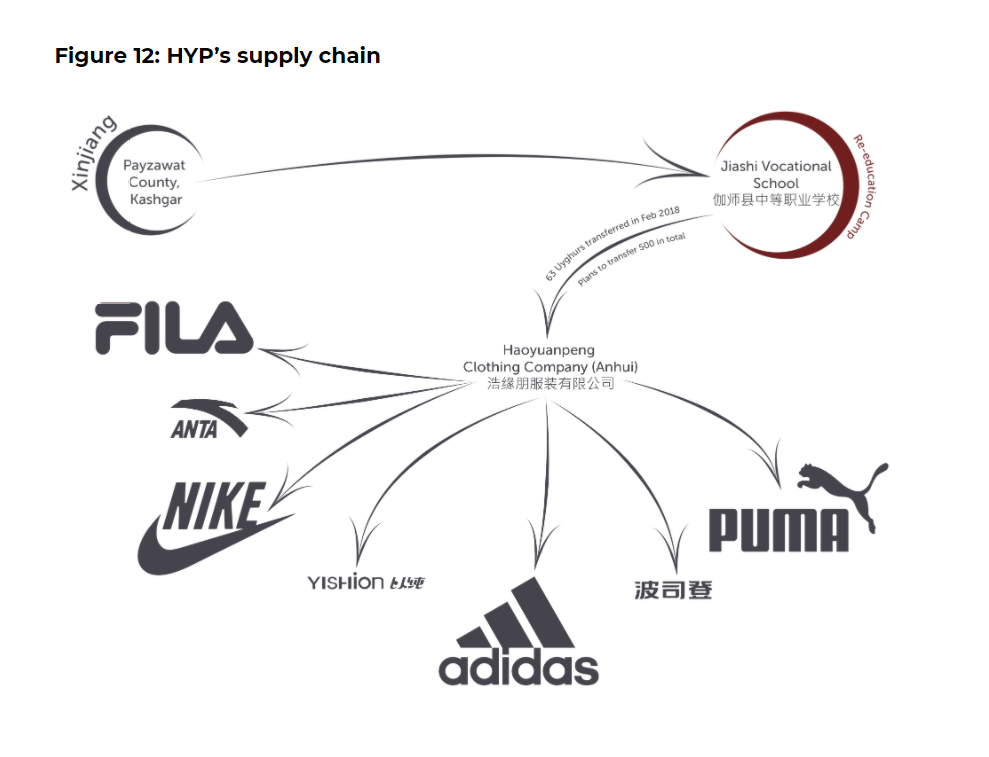In February 2020 the Australian Strategic Policy Institute (ASPI) published a report on the extrajudicial detention of Uyghurs and other Muslim minorities in Xinjiang. The report describes how between 2017 and 2019 the Chinese government transferred at least 80,000 Uyghurs and other ethnic Turkic Muslim minorities from Xinjiang to factories across China and has been forcing them to work on the supply chains of “at least 82 well-known global brands in the technology, clothing and automotive sectors, including Apple, BMW, Gap, Huawei, Nike, Samsung, Sony and Volkswagen.” It seems while outwardly expressing their solidarity for the Black Lives Matter movement, behind the scenes they seem content to turn a blind eye to the fact that their Chinese supply chains are exploiting Uyhgur slaves and, all too often, we see that they appear to be happy to take a reactive rather than a proactive approach when it comes to dealing with exploitation.
ASPI has identified 27 factories in nine different provinces using slave labour transferred from Xinjiang and they report that most of these slaves are transferred directly from Uygher “re-education camps” where they are typically forced to live in segregated dormitories and to “undergo organised Mandarin and ideological training outside working hours”. The ‘workers’ are under “constant surveillance” and even assigned “minders” (the contemporary definition of a slave master it seems).
The report also explains how Uyghur slaves have been repeatedly subjected to intimidation and threats (including threats to harm family members back in Xinjiang). They have no control over their working hours, their dormitories are isolated and they are transported to and from work on dedicated trains in order to ensure further isolation, making them even more dependent and extremely vulnerable. The report even describes how “local governments and private brokers are paid a price per head by the Xinjiang provincial government to organise the labour assignments” and describes one such factory, manufacturing Nike trainers, as having “watchtowers, barbed-wire fences and police guard boxes”. The report goes on to describe numerous factories using slave labour that either directly or indirectly supply western manufacturers, including…
Abercrombie & Fitch
Adidas
Acer
Alstom
Amazon
Apple
ASUS
BAIC Motor
Bestway
BMW
Bombardier
Bosch
BYD
Calvin Klein
Candy
Carter’s
Cerruti 1881
Changan Automobile
Cisco
CRRC
Dell
Electrolux
Fila
Founder Group
GAC Group (automobiles)
Gap
Geely Auto
General Motors
Google
Goertek
H&M
Haier
Hart Schaffner Marx
Hisense
Hitachi
HP
HTC
Huawei
iFlyTek
Jack & Jones
Jaguar
Japan Display Inc.
L.L.Bean
Lacoste
Land Rover
Lenovo
LG
Li-Ning
Mayor
Meizu
Mercedes-Benz
MG
Microsoft
Mitsubishi
Mitsumi
Nike
Nintendo
Nokia
Oculus
Oppo
Panasonic
Polo Ralph Lauren
Puma
SAIC Motor
Samsung
SGMW
Sharp
Siemens
Skechers
Sony
TDK
Tommy Hilfiger
Toshiba
Tsinghua Tongfang
Uniqlo
Victoria’s Secret
Vivo
Volkswagen
Xiaomi
Zara
Zegna
ZTE
ASPI has also identified the supply chains for a number of these global brands and shown how they can be traced back to a number of Chinese factories, currently being supplied with Uygher slave labour by the Xinjiang authorities…



Workers are tracked “physically and electronically”, while Xinjiang’s Human Resources and Social Affairs Department keeps a record of their medical, ideological, employment and social welfare details (as well as other personal details) on a central database. Authorities surveil smartphones to track the worker’s movements and activities and extract information from a WeChat39 group. The worker’s family members are also not exempt from surveillance, which further reinforces the threat against worker’s families and reminds the workers of the risks involved if they decide not to comply with their demands.
It seems dependence on a coal powered industry is not the only thing driving the Chinese economy these days. According to the ASPI report, cheap labour has now also become an important driver of the Xinjiang economy. The Xinjiang authorities are shockingly audacious about their use of slave Labour and are happy to run adverts offering to supply slaves to factories and farms, adds offering “1,000 Uyghur workers aged 16 to 18 years…” under “semi-military style management” who “can withstand hardship” and even reassuring factories that authorities can ensure that there would be “no loss of personnel” by offering to provide “Xinjiang police to be stationed at their factory 24 hours a day”.


The BBC also recently published a report on their website showing Uygher slaves picking cotton in China’s Cotton fields. The BBC explain that they’ve seen documented evidence showing that close to half a millon Uygher slaves have been forced into “the picking of a crop that accounts for a fifth of the world’s cotton supply and is used widely throughout the global fashion industry”.
Earlier this month, the U.S. also took the decision to ban cotton imports from a major Xinjiang based producer after being made aware that the company had been using slaves to pick cotton.
When so many major global brands feel this at ease exploiting slave labour, perhaps, there is never a better time for a global Peace and Justice movement to unite and empower all the exploited people of the world?
If you’d like to join and support Jeremy Corbyn’s global ‘Project for Peace and Justice’, please visit https://thecorbynproject.com/ and sign up today.
Spotlight is 100% independent. Our content is free for all to read and share and we also prefer to stay advert free. If you appreciate this content then please consider supporting Spotlight by subscribing or making a one off donation. You can take out a monthly subscription for as little as £1 a month or you can make a one-off donation if you prefer.



